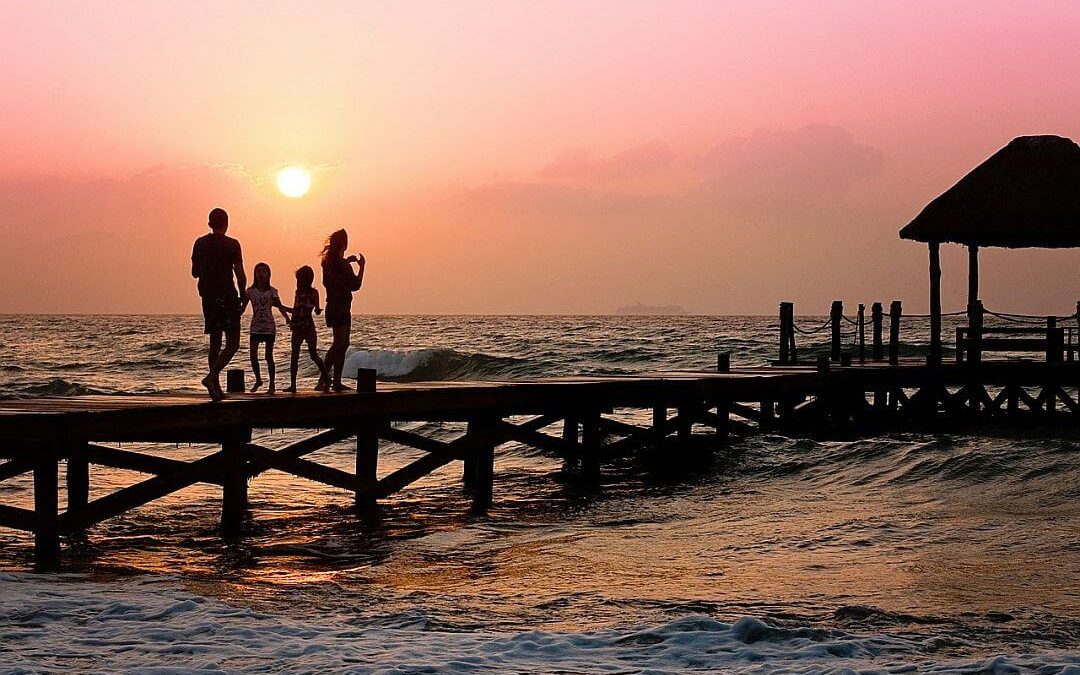Melt-downs, tears and tantrums: just some of the words associated with travelling with young children. But holidays needn’t be stress-filled and tiresome.
Follow my 10 top tips to a wonderfully stress-free holiday.
1. Getting Through The Journey
Few of us enjoy long journeys, least of all young children. Minimise repetitive questions like, “are we nearly there yet?” with a pre-made ‘holiday box’ containing fun things to keep those young and energetic minds and hands occupied. Fill the box with their favourite books, car or plane-friendly games and their beloved action figure or doll. A sweet snack will certainly act as chief bargaining tool when you need it.
If you’re going on an especially long and boring journey, don’t forget to pack the all-important iPad or audio book. After 15 minutes with one of those, you won’t even know your child is there.
2. Plan Ahead
Planning ahead pays untold dividends when it comes to children. Research your accommodation and the area. Is there a beach nearby so you don’t have to lug a buggy round with you? Is a supermarket close so you can stock up on necessities? Are there activities for the children at the resort or at least nearby?
There is nothing more exasperating on holiday than a bored child – and a hot one at that! Planning ahead means that you’re more likely to make them most of your precious time together too.
3. Make A List Of Places To Visit
Before you set off, create a list of child-friendly days out for when a change of scenery is required. Nothing too arduous – perhaps a walk to the next beach or a trip to the local water park. Although children seem to be creatures of habit, trust me – they love a bit of variety!
If you want to go on excursions that you can book from home, do it! No one likes queuing in hot weather, especially young children.
4. What To Wear
If you’re travelling to a hot country, choose clothes for them (and you) that are made from natural fibres and are loose-fitting. Sweat irritates the skin and could lead to sweat rash or prickly heat – and understandably this will make for an unhappy child. Take goggles for the pool or sea, and hats and sunglasses are essential: children’s eyes are more vulnerable to the effects of the sun than yours.
5. Water Rules OK
If the tap water isn’t safe to drink, boiling, filtering or sterilizing is necessary – or buy bottled water. Drinking local water could make you and your child very ill.
Look for the lowest mineral content in bottled water if you need to make up formula feeds and ensure children don’t drink from the taps at any time – including when they’re brushing teeth. Leaving a bottle of mineral water by the sink serves as a reminder.
6. I’m Hungry!!!
Mealtimes at home can be a nightmare. Add into the equation potentially vastly different food in another country and we could be talking dinner-time stress of massive proportions.
To combat this stress, choose restaurants that offer a buffet service – children are more likely to eat at least something this way. Also, before you go on holiday, take them to a restaurant that serves the type of food you’ll typically get – or cook something at home. That way, they’ll be more familiar with that dish and more likely to eat it when you’re away.
If all else fails: repeat after me this stress-lowering holiday-meal mantra: “My children will be OK if they eat more ice cream than fruit while we’re on holiday.” And then yield to the whole five-a-day-nah-one-if-you’re-very-lucky vibe. You’re on holiday, after all.
7. Bed Time Blues
Once you arrive, try to stick to your normal sleep routine as much as possible. If you arrive during daylight hours, go outside as sunlight can help adjust the body clock. Don’t allow late sleeping the next day, but do encourage an afternoon nap.
If your child still needs a nap in the day, factor this in when organising your day to prevent fatigue-induced meltdowns.
Make sure you pack for your child’s bedtime routine: books, baby monitor, essential comfort blanket, cot mobile, etc.
8. Safety First
Once you arrive at your accommodation, make sure you scan the room for potential safety hazards:
- Check plug sockets are covered if you have a toddler. If they’re not, use a plaster to cover them.
- Check the locks on doors and windows work properly and make sure your child is unable to climb over balconies.
If you’re in a hotel room where you see hazards ask to move rooms.
- Check the temperature of the hot water: if it’s much hotter than at home, children who are old enough to wash themselves will need warning.
If you have medicines that you need to keep away from young children, then use hair bobbles to keep the doors shut.
9. Sun-Sense
You’ll be more than aware of the need for high-factor sunscreen (sprays are often best for wriggly children) during the days and early evenings. However, an all-in-one swimsuit is worth its weight in gold, as is a hat that has material covering the back of the neck. Use parasols at the pool and beach and stay out of the sun during the hottest part of the day (11am to 3pm) if possible.
10. And Relax…
Seriously, just relax. Children pick up on tension easily and this will affect their behaviour. This is your holiday, too, so have fun!





